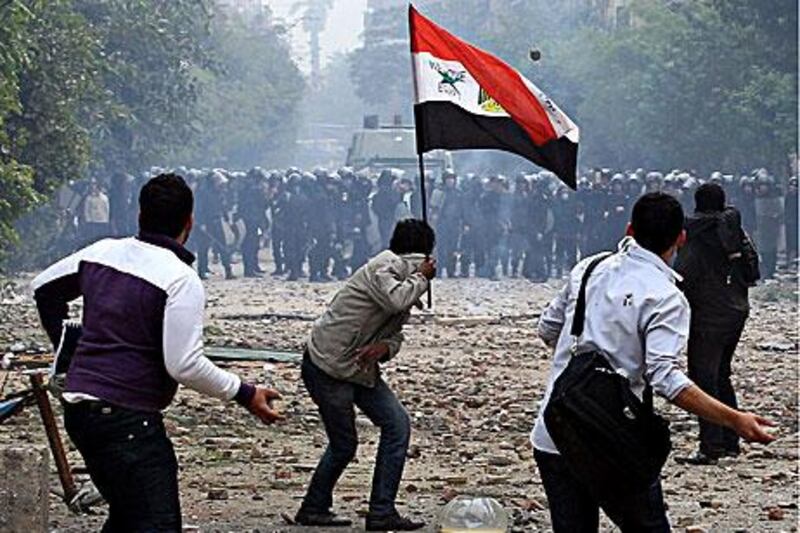CAIRO // Military and riot police launched a major operation yesterday to evict several thousand anti-government protesters from Tahrir Square after two days of clashes.
Using armoured vehicles, tear gas, rubber bullets and batons, security forces moved in at 5pm local time to try to stop demonstrations that pitted them against protesters calling for an end to military rule.
At least four people were killed in the confrontations yesterday in Cairo but it was unclear if security forces had caused the deaths. Nearly 1,000 people were injured, according to the ministry of health.
Large demonstrations also took place yesterday in Alexandria and Suez, where hundreds of police were deployed in the centre of the city.
The situation remained fluid in Cairo last night, with military and riot police retreating from the square, allowing protesters to regroup and re-enter in large numbers.
"We're back in Tahrir, and I don't know where the army went," Karim Ennarah, a 27-year-old human-rights activist, said last night.
Egypt's army seized control of the country during an 18-day protest that forced President Hosni Mubarak to step down in February.
The Supreme Council of Armed Forces (Scaf) pledged a swift transition to democratic rule.
But Scaf, a group of generals, has shown increasing signs it is more interested in maintaining the army's privileged position than it is in ensuring Egypt's democratic future ahead of the first phase of parliamentary elections on November 28.
The protesters are demanding Scaf quickly announce a date for the handover of power to a civilian government.
Many activists also said yesterday they could no longer trust the ministry of interior to secure polling stations for the elections.
But following an emergency meeting of the interim cabinet last night, the government said it was committed to holding parliamentary elections on time.
The meeting was called to discuss "the political and security situation and the aftermath of the Tahrir Square confrontation and the effort to contain the situation", said the cabinet spokesman Mohamed Hegazy.
This month, the Scaf-run cabinet announced a list of supra-constitutional principles, some of which would shield the military from any parliamentary oversight, critics said.
"My friends have been tried and imprisoned by Scaf," said Mohammed Al Qadr, 34, a protester in Tahrir. "Why is it fair that they are punished by this government and Mubarak is being tried by a civilian court?"
Demonstrators chanted yesterday afternoon for "the fall of the field marshal", a reference to Field Marshall Mohamed Tantawi, who heads Scaf.
"We came here to fight for our rights, for our demands," said Mohamed Abdul, a professor at Cairo's Al Azhar University who had joined protesters on Saturday afternoon. "We will not leave. Either we carry out another revolution against Scaf, or they give into our demands and give the power to the people."
Several coalitions and candidates, including the former wife of the presidential candidate, Ayman Nour, announced they would suspend their election campaigns in protest of police brutality at Tahrir.
Activists said the military’s participation in the violence proved their argument that Scaf is no different than the Mubarak-led regime.
"We are reliving January 25," said Mohammed Yusuf, a 31-year-old graphic designer, referring to the first day of anti-government clashes that toppled Mr Mubarak.
Dr Hussein Sabry, 37, also saw no difference between Mr Mubarak and Scaf's generals.
“What is happening now in Tahrir, it is to have the elections cancelled so the country can stay under the control of the army,” he said from his post yesterday at a makeshift clinic treating injured demonstrators. “This was the same idiotic technique used by Mubarak.”
Dr Sabry suffered from smoke inhalation when two tear-gas canisters were fired on the clinic.
Here, tucked away from the main square on a shaded side street, volunteers carted wounded in from the front line on motorcycles and performed minor surgeries to extract rubber bullets.
Activists manned the clinics with bottles of eye drops, Coca-Cola and vinegar – all antidotes to the volleys of tear gas lobbed at demonstrators.
Several prominent political figures, including the former UN nuclear watchdog chief, Mohamed ElBaradei, earlier issued a call for a delay to the legislative polls. They submitted a new transition road map that would see an elected constituent assembly draft a constitution followed by a presidential election and then parliamentary polls.
The recent street protests saw the return of anti-riot police, the branch of the interior ministry most used by the Mubarak regime in its crackdown but rarely deployed since.
On Saturday, medics announced the deaths of Ahmed Mahmoud, 23, who sustained a bullet wound to the chest in Cairo, and Baha Eddin Mohammed Hussein, 25, hit by a rubber bullet in Alexandria as protests spread.
Tens of thousands of people packed Tahrir on Friday for a rally to demand that the army transfer power to civilian rule.
The military has said it will hand over power after a presidential election, which has yet to be scheduled.
foreign.desk@thenational.ae
* With additional reporting by Associated Press, Agence France-Presse and Reuters





